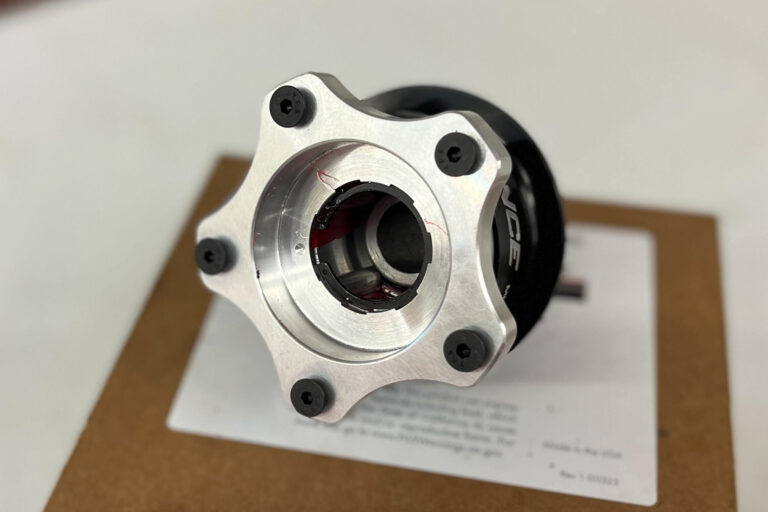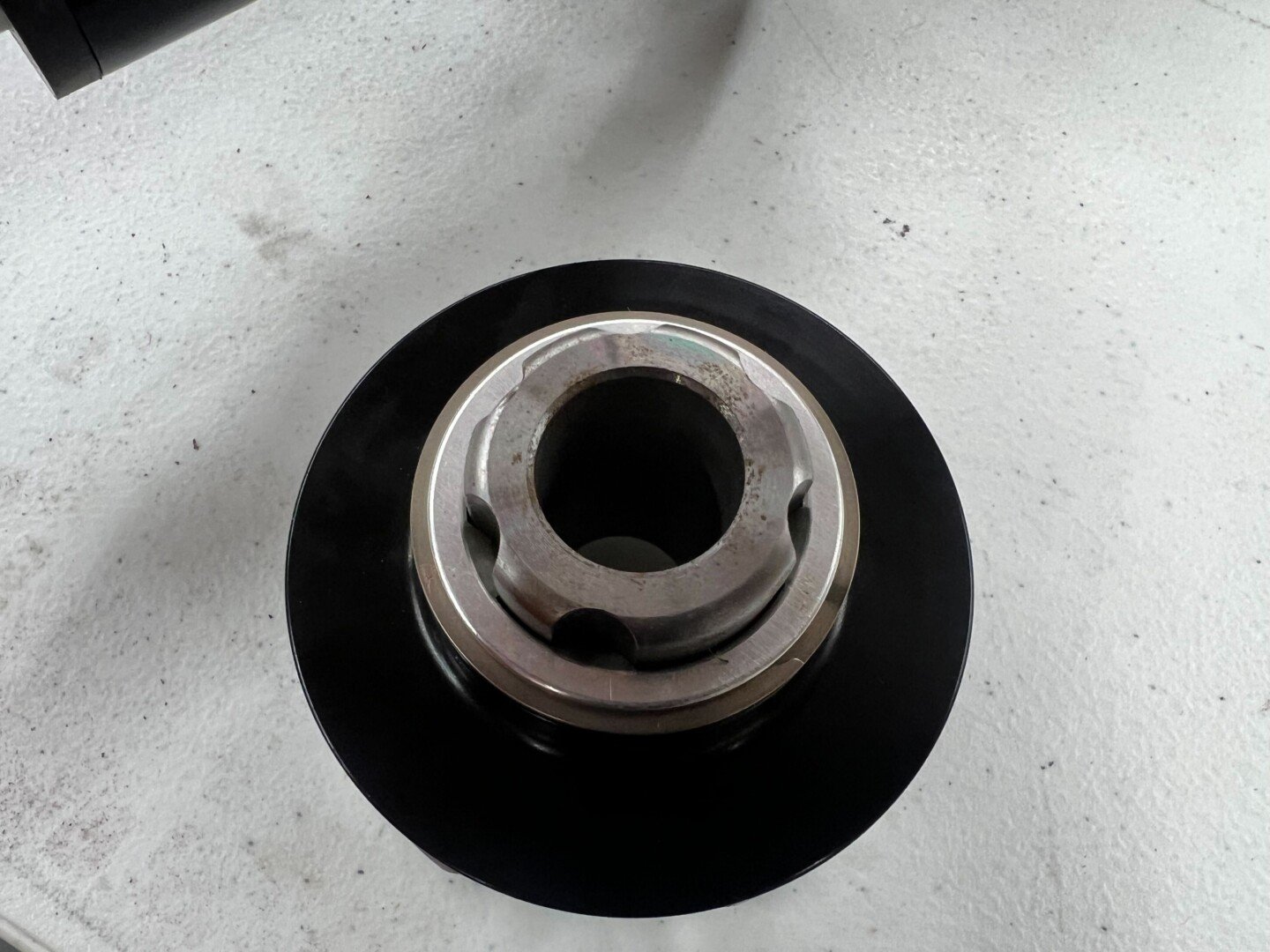One could argue it applies to any ordinary road-going sedan, but certainly a vehicle with a roll cage and door bars where a gymnastics routine is required to get thyself out of the seat: the steering wheel is a pain in the neck…err, the knees. Or maybe it’s both?
Our street/strip Project Number Cruncher Pontiac Firebird Trans Am has been a lengthy work-in-progress, transitioning from a mostly-stock factory muscle car to a more pure-bred racing machine, with a new naturally-aspirated LS engine package, aftermarket suspension components, new driveline, a FuelTech ECU to serve as the brains of the operation, and much more. With a running and driving car, our attention has now turned to safety, weight, and ease of use and maintenance.
Once we got a proper roll cage put in the car, the next step was to replace the factory steering column with not only a lighter, more purpose-built part for racing, but something that would make climbing in and out of the car much easier. An added bonus — and something people often don’t think about it — is that a quick disconnect hub adds security to your vehicle, because if you’re using your vehicle as your transportation, you can simply take the steering wheel inside with you and leave a would-be thief with no means to steer the car away (not applicable to a car with hard-wired buttons on the wheel, of course).
IDIDIT’s New Quick Disconnects
We started with a new fabricated column, and then called up our friends at IDIDIT, who are experts not just in steering columns, but more recently, in the development of sleek quick-disconnect steering hub units. The company first forayed into this market a handful of years ago, and now offers eight different variations of these hubs, including three-, five-, and six-bolt models, seven of those featuring a push-to-connect operation — and two of those with built-in horns. There’s also a classic race-style three-bolt hub that uses a traditional pin-type quick release.
IDIDIT’s all-new push-to-connect quick releases are a completely new, rugged design. This design employs a new-style center and spline pattern with incredibly smooth engagement, close tolerances for a tight fit, and an audible click when seated properly. IDIDIT quick releases are all SFI-certified for safety, and a keyed spline ensures the steering wheel goes on the correct way every time. The removable locating pin allows the hub to quickly and accurately align with the splines, and said locating pin is removable for drivers who prefer the wheel to be uncentered (this is popular in dirt circle track racing, less so for obvious reasons in drag racing).
The pinless-type quick disconnect steering hubs have a positive-lock system with a squeeze-release slip ring mechanism for maximum in safety and convenience to racers.
“Our hub features aircraft-grade aluminum, an anodized black pull ring, and a keyed spline. These quick releases have a fast and smooth engagement, can be pushed to connect without pulling the pull-ring, and make an audible click when properly seated, so you know the wheel is on properly — this is important when you’re about to launch your car down the strip and pick up speed with every passing second,” says IDIDIT’s Eddie Mohr. “Owing to IDIDIT’s focus on quality, they’ve completed tight machining tolerances so there’s no “slop” in the steering wheel for a tight, confident feel in the seat. The kits include the hub and center.
The hub we chose is a five-bolt for a 3/4-inch smooth diameter shaft (P/N: 5010000047) that uses the push-to-connect operation. You simply press the steering wheel on until you feel it engage and “click” to ensure a positive connection, then use both hands to pull back on the hub’s collar to pull the wheel back off.
“We launched our original quick disconnect steering hubs back in 2017, and we gained some feedback from our customers over the years. We wanted to give the customer what they wanted based on their feedback. So now, we have that positive engagement, you know it’s locked in, and it’s very user-friendly,” Mohr says. “This quick disconnect has a proprietary sliding engagement mechanism that we designed in-house, and you definitely feel that click of the engagement.”
Mohr added, “It’s built from a highly durable material, and that’s a big thing. With a lot of these track cars built for racing, weight is important, but you also want a really durable part. Another important thing, too, is that this product is streetable, and is also safe for guys that are racing. With the keyed spline, you know the wheel is going on straight every time. And that’s very important, because you know your wheels are straight, and that the wheel isn’t upside down or driving you down the track or the road at an angle.”
Mohr adds about the all-important SFI certification: “A lot of track cars use quick releases, and some sanctioning bodies require these. So the SFI certification was important for us to ensure they met every standard for racers.”
Once you have your column installed in your vehicle, installing IDIDIT’s quick disconnect steering hub is relatively straightforward. Certainly, you don’t want the hub, wheel, and all to come off mid-run, so welding skills are necessary for the job. Beyond that, the key (no pun intended) is ensuring the wheels are perfectly straight so this can be a one-and-done process.
“The biggest thing that we’ve seen when it comes to installation of the keyed spline is people lock in the center on the shaft without the wheels straight. When you’re installing the splines, it’s important to be sure the wheels are perfectly straight,” Mohr says. He adds about the fabrication process: “Some racers are using 3/4-inch rod and welding these on; just be sure you have a prepped, weldable surface. It’s important to prep for welding to get a solid finished product.”
Tips For Ensuring Your Wheels Are Straight
As you prepare to position the spline onto the shaft, bear in mind that the key to a vehicle driving in a straight line is ensuring that the front wheels are directly in line with the rear axle. That’s what determines how the car is going to steer. It’s not about how the front wheels look relative to the body. Certainly, if you have built the car right and everything is centered properly, your wheels should appear straight to the naked eye.
With a unibody or factory frame car like our Project Number Cruncher, the frame itself is not always a reliable indicator of the point of center — the frame could have been designed unsymmetrical side to side, or could be kinked from age or accidents. So a great and simple way to do this is to run a string from the centerline of the front wheels, to the center of the rear, on both sides of the car; if the measurements line up, then the front wheels are straight in relation to the rear axle, and the car should drive straight.
A full chassis car that, again, has been meticulously measured out and centered and is known to be perfectly straight (including the housing being straight in the car), can be done by measuring from the leading and trailing edge of both front wheels/tires inward to the framerail. Even then, though, it’s not a bad idea to double-check your work with the string method.
Even if you’re not racing, but frequent car shows, like to cruise or travel distances in your ride, quick disconnect steering hubs are worth their weight in gold — they’re lightweight, safe, secure, and best of all, they make getting out of your car, no matter your age or physical flexibility, a breeze.






